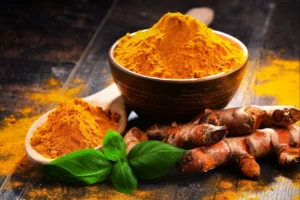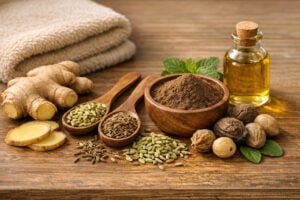
The 6 Best Food & Herbs For Staying Healthy, Happy & Balanced In The Winter
By Dr. Puja Shah
The cold temperatures, the flu and cold season, and the dark days. When the Winter Blues arrive, everyone knows it.
Ayurveda follows the seasons, but not the way we are accustomed to thinking of. We generally think of the seasons as spring, summer, fall, and winter – but Ayurveda teaches us that it’s not the calendar months, but nature that determines which Dosha will be influenced.
Ayurveda recognizes winter as a Kapha season with strong Vata qualities from fall. Between the cold weather, heavy feeling, increased moisture from rain, snow, and cloudy skies, many animals slowly ground themselves into hibernation.
Just like the animals allow nature to speak to them, it is important we do as well.
Therefore, it’s vital to be aware of which season has the same qualities as your predominant dosha. For example, a person with a high Vata constitution will have a tendency to go out of balance in the early winter, while a Kapha person will go out of balance in the late winter.
And so while everyone needs to take extra care during winter, Vatas and Kaphas in particular must be focused and disciplined in their nutrition and lifestyle in order to stay in balance.
How do you know you are out of balance in the winter?
Signs of Kapha imbalance include slow and sluggish bowel movements, feeling lethargic, weight gain, thick coating on the tongue, excess mucus, difficulty in waking up in the morning, and seasonal allergies and sinus congestion.
Signs of Vata imbalances can include dryness, bloating, insomnia, joint pain, constipation, colds, and stress.
Balancing the winter Doshas can be done with food, which Ayurveda says is the medicine of life.
“When the diet is wrong, medicine is of no use; when the diet is right, medicine is of no need.”
- Ayurvedic proverb
Foods and herbs that can help balance Kapha:
- Ginger: Known for its warming properties, ginger helps to stimulate digestion and improve circulation. Adding ginger to meals or drinking ginger tea can help combat Kapha-related symptoms.
- Turmeric: A powerful herb with anti-inflammatory properties, turmeric can help alleviate joint stiffness and promote healthy digestion. Incorporating turmeric into warm drinks or meals can contribute to balancing Kapha.
- Leafy greens: Bitter and astringent leafy greens like kale, spinach, and collard greens can help counteract Kapha’s heaviness. Including these greens in salads or lightly cooking them can be beneficial.
Food and herbs that can help balance Vata:
- Ghee: This clarified butter is considered a nourishing and grounding food. Adding a teaspoon of ghee to warm meals or using it for cooking can help pacify Vata.
- Cinnamon: Known for its warming properties, cinnamon can help stimulate circulation and improve digestion. Adding cinnamon to beverages, breakfast cereals, or baked goods can create a balancing effect for Vata.
- Nourishing soups and stews: Including warm and well-cooked meals in your diet, such as hearty soups and stews made with root vegetables and spices, can help soothe Vata’s cold and dry qualities.
The Winter Blues can be challenging – but with a little help from Ayurveda, you can sustain radiant health and balance all through the cold months.
Disclaimer: The information provided in this blog post is not a substitute for professional medical advice. Please consult with a qualified Ayurvedic practitioner or healthcare professional for personalized guidance pertaining to your specific health needs.
Bonus tip: Ayurvedic Tip Of The Week
Ayurveda’s best advice for thriving through the cold and dry winter season is to focus on three main qualities: warmth, moisture, and calmness. You can achieve this by taking more warm and oily cooked foods, keeping your body warm (no surprises there!), and in sticking to a routine that gives you plenty of time for rest, relaxation, and meditation.

About Dr. Puja Shah, Editor-in-Chief of The Natural Law
Dr. Puja Shah is an award-winning author whose 93 year old grandmother swore by Ayurvedic remedies and practiced yoga into her last days. And so while her education includes 9 years of medical training as a dentist, 3 teaching qualifications in yoga, and dozens of courses in meditation, it’s no wonder that she always goes back to Ayurveda. Puja harnesses Ayurveda regularly with her children and husband Amish Shah, Founder of The Natural Law.
Stock Up On Winter Supplies In Our Marketplace
In Ayurveda, each season brings changes not just to the weather - but to the balance of our Doshas. The winter season is known to have a particular impact on those with dominant Kapha and Vata Doshas, causing bouts of lethargy, weight gain, seasonal allergies, and more.
Natural Neem Cinnamint Mouthwash by Desert Essence

The cinnamon in this soothing mouthwash helps improve circulation and digestion
Turmeric Ginger Tea by Buddha Teas

Contains a bouquet of warming, anti-inflammatory ingredients for cold days and nights.
Turmeric Supplements by Organic India

Turmeric helps reduce inflammation and joint stiffness, while promoting better digestion.
Ghee Butter by 4th & Heart

Add a teaspoon to warm meals to pacify your Vata Dosha, and add a grounding effect to food.
Recent Blog Post

© 2023 The Natural Law | Privacy Policy | Terms of Use








